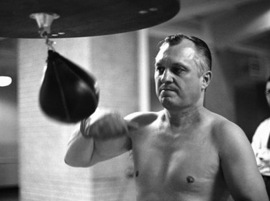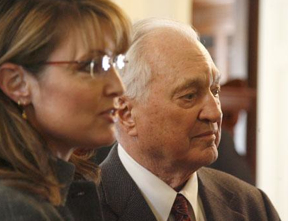The death of Walter J. "Wally" Hickel (1919-2010) in Anchorage this past Friday marks the end of a remarkable era, not only in Alaska, but throughout the entire United States.
The two-time Governor of the Last Frontier (elected once as a Republican in the 1960s, the second time as an Independent in 1990) and former U.S. Secretary of the Interior under Richard Nixon was a larger than life figure, a legend in his own time, whose driving ambitions and relentless personal energy helped to both shape and define Alaska's 50 years of statehood. He had arrived in Anchorage in 1940 with 37 cents in his pocket, and it proved to be all the stake he would ever need. His robust spirit and seemingly boundless energy assured his success, not only in Alaska's bare-knuckle politics, but in the arenas of business and public policy as well.

Born in Kansas in 1919, Hickel was raised in an era when a handshake secured a deal and a commitment still meant something. He was a casual friend of my great uncle, an Italian fish vendor from California of the same generation, and they lived their lives under a code of conduct defined by integrity and an unyielding loyalty to friends and allies. Hickel was forced out of the Nixon White House after criticizing Nixon's handling of student protests during the Vietnam War. "Regardless of how I, or any American, might feel individually, we have an obligation as leaders to communicate with our youth and listen to their ideas and problems," he wrote. He refused to compromise his personal ethics.
I spent a fascinating morning with Hickel this past summer, in the office of his downtown Anchorage landmark, the Captain Cook Hotel, and he was every bit as dignified and gracious as he was when I first encountered him 35 years earlier in Anchorage, then a raw and wild oil town.
As he approached his 90th birthday, his grip was still strong and his "boomer" vision of Alaska remained his passion. A former boxer, he looked like he could still go a few rounds and I wouldn't want to cross him. He may have lost some of his intellectual edge after nine decades, but his spirit remained undaunted, his eyes bright, particularly when his bride of 67 years, Ermalee, later joined us in the conversation.
Hickel was still pushing his vision of an "owner state"--articulated in his book Crisis in the Commons: The Alaska Solution--and he remained upbeat about the possibilities facing Alaska. He was convinced that the "Age of the Artic" was still ahead and he still believed in "big ideas."
But when I asked Hickel about then governor Sarah Palin, his disposition turned hard. Hickel had played a major role in her victory as governor in the 2006 election--his stamp of approval went a long way toward getting her elected--and he expected a place at the table with the young governor as she was set to guide Alaska into the New Millenium.
In the immediate aftermath of Palin's election, however, Palin cast Hickel aside. As anyone who has ever worked with or for Sarah Palin knows full well, her capacity for deceit and betrayal knows no bounds. She stabbed Hickel in the back.

As a result, Hickel viewed Palin with personal disdain, describing her "political opportunism" in the most condemnatory terms possible. He had lost all respect for her. She "used" him like she would use many other patrons as she scratched and lied her way to a strange form of national political celebrity, and Hickel was not afraid to call it like he saw it. He was not bitter--he was a much bigger man than that--but at the same time, he was not afraid to show his disgust. "I don't give a damn about her," he told me.
I found his candor refreshing. Not only did he view Palin as a political parvenu, he viewed her as a puppet. "She's not her own woman," he said to me several times. He was strongly opposed to her plans for a TransCanada pipeline--he did not believe it would ever be built--and he championed instead an All Alaska gas-line project from Prudhoe Bay to Valdez. In a stinging opinion piece he wrote a year ago this week, he declared, "If I were governor, we would start building the All-Alaska gas line tomorrow. All it takes is some guts and a decision."
It didn't take much to read between those lines.
When I asked him for a formal, on-the-record response to Palin's stunted career as governor, he took a deep pause. "She fell in love with the national spotlight and lost her ethical compass," he said thoughtfully. "That was a sad day for Alaska and America."
In the aftermath of Palin's resignation, Hickel wrote a prescient opinion piece for the Anchorage Daily News (where he was a regular contributor until just last month), in which he expressed his criticism of Palin for being a polarizing figure along both class and racial lines during the national campaign. He urged her "to rise above the worn-out, negative tactics of presidential politics and assume the role of stateswoman."
While acknowledging his initial support for Palin's nomination, he expressed his horror at the divisive nature of her political rhetoric:
Palin became the spokesperson for the divisive voices in American politics. She dismissed the greatness of our immigrant heritage, indeed of today's Alaska, where in Anchorage alone nearly 100 languages are spoken in the homes of the children in our public schools.
Not surprisingly, Palin did not dignify Hickel's passing with a formal acknowledgment on her Facebook page, but instead issued a shameful and shallow "reflection" on Twitter in her distinctive Palinese:
Upon his passing,we honor Gov Walter Hickel's life,he made real difference in the world.Unsurpassed impacts on Alaska,the Arctic&her people[sic]
That was it. Palin was well aware of Hickel's disdain, and she could not rise above her pettiness to issue the formal acknowledgment that his life and career warranted.
Indeed, these two figures represent the anithesis of Arctic politics. Whereas Hickel was a man whose destiny was always greater that his own, Palin's has always been wrapped up in her own self-interest. Whereas Palin is all about style, Hickel was a man of substance. In the end, the shadow of his political legacy in the Last Frontier will forever loom long beyond that of Sarah Palin's. His was real and transcendent--while hers is small and remains nothing but a fantasy.

Award-winning writer and filmmaker Geoffrey Dunn's book The Lies of Sarah Palin: The Untold Story Behind Her Relentless Quest for Power will be published by St. Martin's Press.
